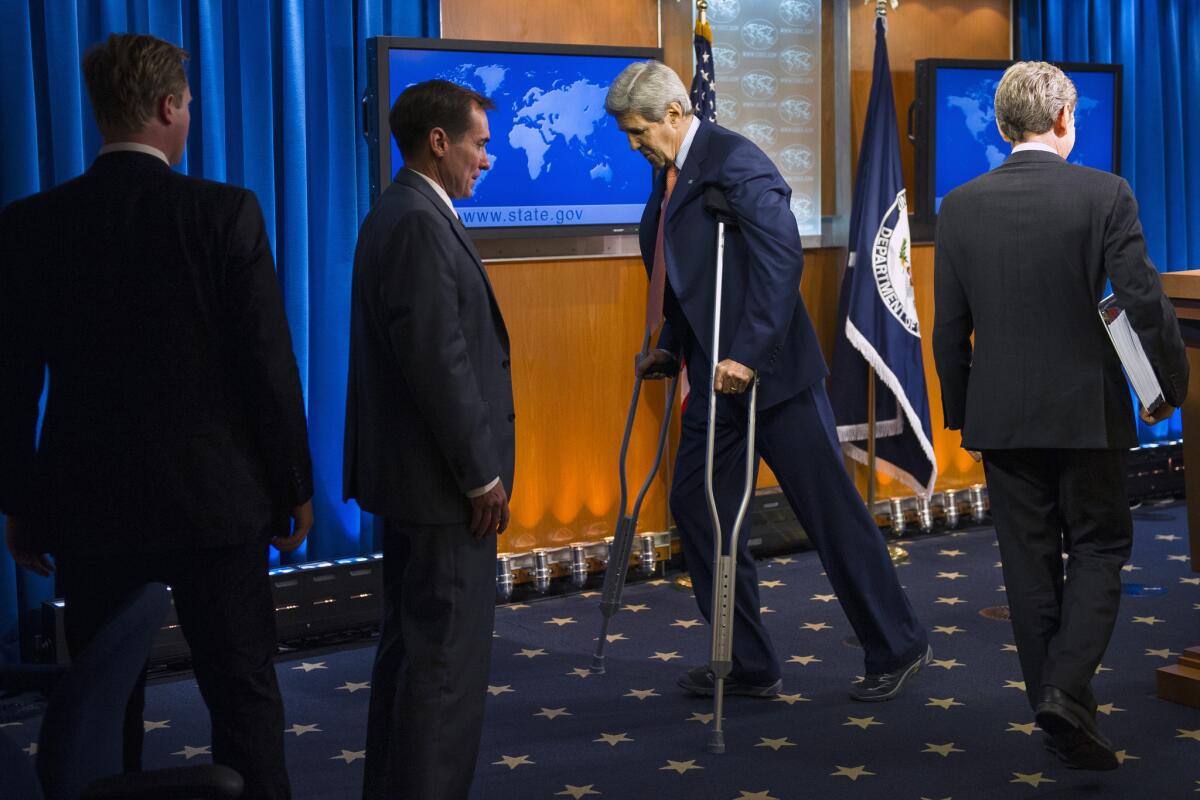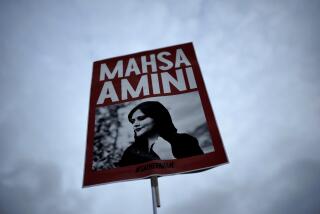U.S. sharply criticizes Iran’s human rights record on eve of nuclear talks

Secretary of State John F. Kerry leaves the lectern after presenting the State Department’s annual human rights report in Washington. Kerry remains on crutches as he recovers from a bicycle accident.
Reporting from Vienna — On the eve of talks to conclude a landmark nuclear deal with Iran, the Obama administration Thursday identified the Tehran government as one of the world’s worst abusers of human rights.
In its annual report on human rights around the world, the State Department cited the theocratic government for depriving its citizens of a range of freedoms, including the right to choose their leaders through free elections. The report portrayed the Iranian justice system as harsh and arbitrary, particularly in cases involving the government’s political opponents, and said senior officials do not punish officials who commit abuses.
Some of the most serious abuses in the past year grew from the government’s disregard for the physical safety of citizens, “whom authorities arbitrarily and unlawfully detained, tortured or killed,” the report said.
Iran was among a handful of countries singled out by Secretary of State John F. Kerry in an introduction to the report. The department also criticized the rights records of Cuba, Myanmar and Vietnam, countries with which the administration is trying to improve relations.
Cuba’s government was cited for harassment of political opponents, a lack of free speech, intimidation and abusive detentions. The report also said that Russia has become increasingly authoritarian and has moved to deny free speech.
Many of the abuses alleged in the report had been catalogued by the State Department in past years’ reports. But this year’s volume has had more visibility than normal because of the nuclear negotiations with Iran.
The report was supposed to have been released on Feb. 25. The adminstration’s critics had charged that the State Department was delaying its release to avoid provoking Iran and possibly hurting prospects for a nuclear deal.
State Department officials have said the release was delayed because of the hectic travel schedule of the secretary, who customarily is present at the report’s release to give it visibility.
Sen. Ted Cruz (R-Texas), a presidential hopeful, had proposed fining the State Department for further delays.
Without identifying him by name, the report cited the case of Washington Post reporter Jason Rezaian, a dual U.S.-Iranian citizen, who was imprisoned last July in Iran and is now on trial on unspecified charges. Rezaian has been denied legal representation and U.S. consular help and is at risk because of health problems and psychological stress, the report said.
The report said the Iranian government has severely restricted freedoms of assembly, speech, religion and the press.
It detailed a variety of abuses in the judicial system, including disappearances, judicially sanctioned amputations, and violence against political adversaries. Iran has the second-highest rate of executions in the world and often ignores guarantees of due process made in the country’s own constitution, the report charged.
The report also questioned the political legitimacy of Iranian supreme leader Ayatollah Ali Khamenei, who will make the ultimate decision on whether Iran accepts a nuclear deal.
Khamenei dominates “key power structures,” the report said, noting that while many Iranians take part in elections, an unelected body screens out candidates deemed unacceptable.
The report acknowledged that much of its information came second-hand, through private human rights advocacy groups, because the United States doesn’t have diplomatic relations with Iran.
For more on U.S. foreign policy, follow @RichtPau
More to Read
Sign up for Essential California
The most important California stories and recommendations in your inbox every morning.
You may occasionally receive promotional content from the Los Angeles Times.











